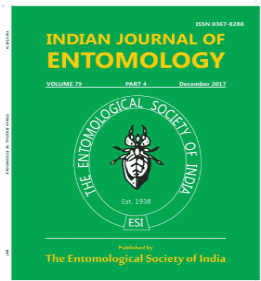Impact of IPM Modules on Natural Enemies in Okra
DOI:
https://doi.org/10.55446/IJE.2024.1306Keywords:
Coccinellid, okra, IPM modules, spider, coimbatore, BIPM, predator, B. thuringiensis, NSKE, emamectin benzoate.Abstract
Three modules viz., M1- integrated pest management (IPM) module, M2- bio-intensive pest management (BIPM) module and M3- farmer’s routine pest management module formulated against insect pests of okra were evaluated simultaneously at two locations to know their impact on spider and coccinellid predators. Seven and two species of spiders and coccinellids, respectively, were recorded. Pooled data revealed that BIPM module was found to be safe for the predators.
Downloads
Metrics
Downloads
Published
How to Cite
Issue
Section
References
Anonymous. 2018. Horticultural Statistics at a Glance 2018, Department of Agriculture, Cooperation & Farmers’ Welfare, Ministry of Agriculture and Farmers’ Welfare, Government of India. pp 196. Available from: https://nhb.gov.in/statistics/Publication/Horticulture%20Statistics%20at%20a%20Glance-2018.pdf. accessed 3rd March 2023.
Bhatt B, Joshi S, Karnatak A K. 2018a. Biodiversity of insect pests and their predators on okra agroecosystem Journal of Pharmacognosy and Phytochemistry 7(4): 84-86.
Bhatt B, Karnatak A K. 2018. Population dynamics of sucking pests and their predators on okra agroecosystem. Journal of Entomology and Zoology Studies 6(2): 1289-1291.
Chagnon M, Kreutzweiser D, Mitchell E A D, Morrissey C A, Noome D A, Van der Sluijs. 2014. Risks of large-scale use of systemic insecticides to ecosystem functioning and services. Environmental Science and Pollution Research 22(1): 119-134. DOI: https://doi.org/10.1007/s11356-014-3277-x
Chakraborty A, Kumar K, Pal D J. 2014. Impact of certain agrochemicals on the population of coccinellid beetles (Coleoptera: Coccinellidae) in bhendi (Abelmoschus esculentus (L.) Moench) ecosystem. International Journal of Plant, Animal and Environmental Science 4(2): 267-271.
Das R, Saikia D K, Devee A, Ahmed S S. 2021. Succession of major pests and predators in okra (Abelmoschus esculentus (L.) Moench) ecosystem. International Journal of Current Microbiology and Applied Sciences 10(01): 2174-2183. DOI: https://doi.org/10.20546/ijcmas.2021.1001.249
Devi L L, Ghule T M, Chatterjee M L, Senapati A K. 2015. Biorational management of shoot and fruit borer of okra (Earias vittella Fabricius) and their effect on insect predators. Environment and Ecology 33(3): 1052-1054.
Ding, J, Li H, Zhang Z, Lin J, Liu F, Mu W. 2018. Thiamethoxam, clothianidin, and imidacloprid seed treatments effectively control thrips on corn under field conditions. Journal of Insect Science 18(6): 1-8. DOI: https://doi.org/10.1093/jisesa/iey128
Filomeno C A, Barbosa L C A, Teixeira R R, Pinheiro A L, Farias E D S, Silva E M D P and Picanco M C. 2017. Corymbia spp. and Eucalyptus spp. essential oils have insecticidal activity against Plutella xylostella. Industrial Crops and Products 109: 374-383. DOI: https://doi.org/10.1016/j.indcrop.2017.08.033
Ghosh S K. 2013. Harmful Effect of insecticides in the population dynamics of spiders on lady’s finger Abelmoschus esculentus (L.) Moench at field level. American-Eurasian Journal of Agriculture Environmental Science 13(9): 1181-1186.
Gomez K A, Gomez A A. 1984. Statistical procedures for agricultural research. Wiley International Science Publication, John Wiley and Sons, New Delhi. 680 pp.
Govindan K, Gunasekaran K, Kuttalam S. 2013. Emamectin Benzoate 5 SG: A safer insecticide to coccinellids predators in cotton ecosystem. African Journal of Agricultural Research 8(21): 2455-2460.
Jeyaparvathi, Baskaran S S. 2013. Predatory potential of spiders on the major okra pests. Entomology, Ornithology and Herpetology: Current Research 2(2): 58.
Kanwar N, Ameta O P. 2007. Assessment of loss caused by insect pests of okra, Abelmoschus esculentus (L.) Moench. Pestology 31(5): 45-47.
Kaushik A K, Yadav S K, Srivastava P. 2016. Impact of various insecticides on natural enemies in cowpea ecosystem. Annals of Entomology 34: 57-64.
Kodandaram M H, Rai A B, Halder J, Manjunath M. 2014. Relative susceptibility and resistance of whitefly Bemisia tabaci (Hemiptera: Aleyrodidae) to neonicotinoid insecticides in vegetable crops. Proceedings. AZRA silver jubilee international conference on probing biosciences for food security and environmental safety, CRRI, Cuttack, Odisha, 2014. pp. 153-154.
Kumar R. 2018. Evaluation of insecticides against whitefly on tomato and their effect on natural enemies. Journal of Pharmacognosy and Phytochemistry 7(1S): 789-792.
Meenambigai C, Bhuvaneswari K, Mohan Kumar K, Sangavi R. 2017a. Pesticides usage pattern of okra, Abelmoschus esculentus (L) Moench in Tamil Nadu. Journal of Entomology and Zoology Studies 5(7): 1760-1765.
Meenambigai C, Bhuvaneswari K. 2023. Dissipation and degradation kinetics of commonly used pesticides and their metabolites in/on okra, Abelmoschus esculentus (L.) Moench. Current Science 124(4): 442-450.
Meenambigai C. 2017b. Evaluation of pest management modules and dissipation pattern of selected insecticides in okra. M Sc thesis, Tamil Nadu Agricultural University Coimbatore. 203 pp.
Mohanasundaram A, Sharma R K. 2011. Effect of newer pesticide schedules on the population of sucking pests and predators of okra. Pesticide Research Journal 23(1): 55-63.
Mughal T K, Ullah Z, Sabri M A, Ahmad S, Hussain D. 2017. In vitro comparative toxicity of different insecticides against adults of seven spotted beetle, Coccinella septempunctata L. (Coleoptera: Coccinellidae). Journal of Entomology and Zoological Studies 5(6): 498-502.
Potai A, Chandrakar G. 2018. Studies on the seasonal incidence of major insect pests and its natural enemies on okra and their correlation with weather parameters. International Journal of Current Microbiology and Applied Sciences 6: 204-210.
Preetha G, Nadarajan L. 2011. Effect of IPM modules on natural enemies in bhendi ecosystem. Pest Management Horticulture Ecosystem 17(2): 149-155.
Raghuwanshi P K, Singh U C, Bhadoria N S, Tomar S P S, Bharti O P. 2019. Succession and incidence of insect pests and their natural enemies in okra. International Journal of Chemical Studies 7(5): 4442-4445.
Randhawa H S, Pandey V K. 2020. Efficacy of selected insecticides against leaf hopper [Amrasca biguttula biguttula (Ishida) of okra [Abelmoschus esculentus (L.) Moench]. International Journal of Current Microbiology and Applied Sciences 9(6): 281-287. DOI: https://doi.org/10.20546/ijcmas.2020.906.036
Sangamithra S, Vinothkumar B, Manoharan T, Muthukrishnan N, Rathish S T. 2018. Evaluation of bioefficacy, phytotoxicity of imidacloprid 17.1% SL against plant and leaf hoppers and its safety to non-target invertebrates in rice. Journal of Entomology and Zoology Studies 6(1): 230-234.
Sardana H R, Bambawale O P, Kadu L N, Singh D K. 2005. Development and validation of adaptable IPM in okra through farmer’s participatory approach. Annals of Plant Protection Science 13(1): 54-59.
Singh B, Gaur R K, Jakhar A. 2023. Effect of newer insecticides on coccinellids population in okra. The Pharma Innovation Journal 12(3): 2807-2810.
Stehle S, Schulz R. 2015. Agricultural insecticides threaten surface waters at the global scale. Environmental Sciences 112(18): 5750-5755. DOI: https://doi.org/10.1073/pnas.1500232112
Sujayanand G K S, Sharma R K, Shankarganesh K. 2016. Impact of intercrops and border crops on pest incidence in okra. Indian Journal of Horticulture 73(2): 219-223. DOI: https://doi.org/10.5958/0974-0112.2016.00051.7
Vikas C, Singh A D, Kanwar K, Lokender K. 2023. Avoidable yield losses caused by major insect pests on okra. Journal of Entomological Research 47(2): 377-380. DOI: https://doi.org/10.5958/0974-4576.2023.00068.3
Wagan T A, Wagan Z A. 2015. Natural enemies associated with jassid on okra crop under natural agro-ecosystem. Field studies 34: 117-121.
















